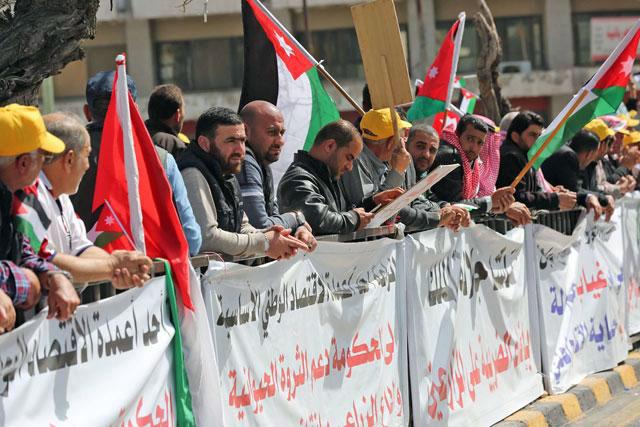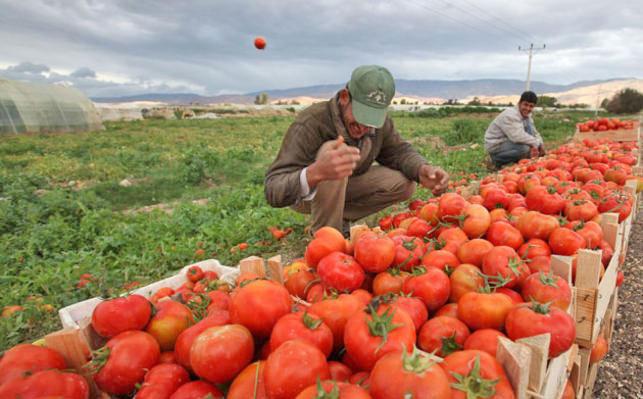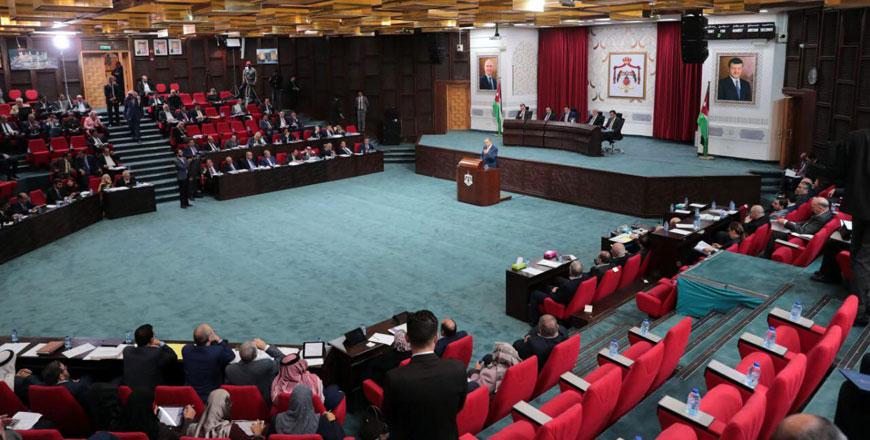You are here
Farmers to resort to ‘their last hope’ as Senate endorses amended income tax law
By Renad Aljadid - Nov 27,2018 - Last updated at Nov 27,2018

Farmers stand outside Parliament in March this year, protesting against the recent government’s decision to increase taxes (Photo by Osama Aqarbeh)
AMMAN — Farmers and stakeholders said they were deeply disappointed after the Senate on Monday endorsed the Lower House’s version of the income tax draft law which cancelled exemptions for the agricultural sector.
This time, the agricultural sector’s representatives said that they were not going to strike or protest in response, but will rather resort to “their last hope” — His Majesty King Abdullah, calling on him not to ratify the bill in its current version. They had earlier warned that endorsing the bill would “destroy the farming business completely”.
Despite several attempts by The Jordan Times to contact the Lower House’s Agriculture Committee, none of the members were available for comment by print time.
In previous debates over the bill, the Lower House had granted “full exemption” to agricultural inputs and outputs from income tax, while the Chamber’s Economic and Investment Committee suggested that only individual farmers and agricultural companies whose annual income was less than JD25,000 and JD1 million respectively be exempted from the tax.
The Jordan Exporters and Producers Association for Fruits and Vegetables vice president, Zuhair Jweihan, said that individual farmers would be the most affected by the amended law due to the “tremendously expensive” production costs which they said diminishes profits.
“Farmers who make JD25,000 annually actually pay a similar amount in production costs, and sometimes even more, so they end up not just unable to earn money but even losing it,” Jweihan told The Jordan Times, stressing that “there is actually no income to pay the income tax”.
He said that farmers had begun thinking of migration to other countries where they could produce at lower costs and export their items back to Jordan.
“All the developed world’s countries, even those who have sufficient trade and industry resources, support the agricultural sector with billions, but here the sector is not only not supported, but even faced with loads of obstacles,” Jweihan added.
For the Jordan Valley Farmers Union President Adnan Khaddam, the decision was “a shock to an already deteriorating sector, even though it is Jordan’s main source of food security”.
“This is an explicit attempt to destroy the agricultural sector,” Khaddam charged, adding that around 24,000 farmers are currently called for prosecution over financial cases, after their agricultural businesses suffered heavy taxes and continual losses.
The Jordan Agricultural Engineers Association stressed its rejection of the bill, calling on His Majesty King Abdullah not to endorse it, and open the door to further discussions in order to reach a compromise that falls in the interest of the people and the country’s economy, according to a statement sent to The Jordan Times.
Jweihan stressed that “all sectors are part of the same circle, so if one sector falls, other sectors will be affected as well”.
“When the prices of people’s main food — fruits and vegetables — becomes extremely high as a result of increased taxes, who will have money to buy anything else?” he asked.
Related Articles
AMMAN — Representatives of the agriculture sector on Tuesday applauded the government’s decision to exempt agricultural production inputs fr
AMMAN — The Lower House on Tuesday began its deliberations over the 2018 amendments to the Income Tax Law, turning down a request by some MP
AMMAN — The recent income tax bill endorsed by the Lower House is expected to result in a decline in the volume of forecasted revenues, econ

















